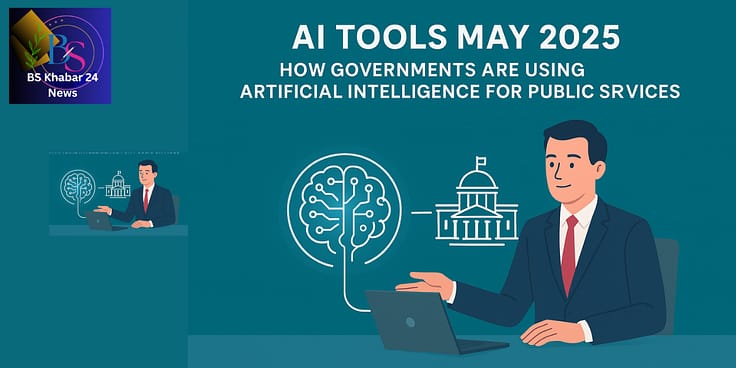New AI tools May 2025 in released: How governments are using artificial intelligence
AI Tools May 2025: How Governments Are Using Artificial Intelligence for Public Services”
New AI Tools May 2025 has been no exception to the rapid evolution of artificial intelligence (AI). Several state-of-the-art AI technologies were released this month and are already finding their way into public services, government offices, and national security systems worldwide. Governments are now employing AI as a useful answer to real-world problems rather than merely as a trendy term, from enhancing cybersecurity to bettering healthcare systems.
This blog will discuss the most recent artificial intelligence (AI) capabilities that were made available in May 2025 and how governments are implementing them to better serve their constituents.
New AI Tools May 2025
Several AI systems created by both tech behemoths and creative entrepreneurs were introduced in May. Among the notable ones are:
CivicAI Suite is a government-focused artificial intelligence tool created to automate paperwork, improve citizen complaint handling, and expedite public administration.
Predictive AI models enable SecureNet AI, a cybersecurity technology that can spot risks before they materialise into extensive cyberattacks.
MediAssist AI Tools May 2025 is a healthcare AI technology that helps physicians diagnose patients more quickly, particularly in resource-poor rural locations.
UrbanVision AI is a smart city planning technology that enhances urban life by utilising real-time data on infrastructure, transportation, and pollution.
Many countries have already begun using these technologies to update their systems, so they are not merely experimental.
Governments Leading the Way
Public Administration and Citizen Services
Red tape and bureaucracy have always irritated citizens. Governments may now handle applications, renewals, and complaints far more quickly thanks to the launch of CivicAI Suite. To cut down on wait times at government offices, some Indian states are experimenting with AI-powered chatbots that can answer questions from citizens in a variety of languages.
Healthcare Innovations
The globe learnt the value of robust healthcare systems during the COVID-19 epidemic. These days, governments are spending money on AI programs like MediAssist AI, which uses AI-powered data analysis and imaging to assist identify illnesses early. In order to help doctors treat patients more quickly, hospitals in the UK are implementing experimental projects where AI scans medical reports.
National Security and Cyber Defense
Governments around the world continue to be very concerned about cyber dangers. To fortify digital borders, SecureNet AI is being implemented in the US and some regions of Europe. Predictive analytics is used to keep an eye on questionable online activity and identify possible hacks before they do any harm.
Smart Cities and Infrastructure
Governments are using AI, such as UrbanVision AI, to plan more efficient transportation routes, control energy use, and lessen pollution as urban populations increase. While smart AI cameras are being deployed to monitor road safety in Dubai, AI-driven traffic management is already reducing congestion in Singapore.
The Challenges Ahead
Even while AI has many advantages, governments are also having to deal with new difficulties. Important issues include:
Data privacy: People are concerned about the use and security of their personal information. To guarantee openness, governments must enact precise laws.
Bias in AI Systems: AI systems may inadvertently discriminate against particular groups if they are not properly constructed. For instance, under-represented communities may receive incorrect diagnoses as a result of biassed data in healthcare AI.
Employment Displacement: Some positions in public administration may be replaced by automation. Governments must reskill workers in order to strike a balance between efficiency and job prospects.
The Future of AI in Governance
These AI technologies’AI Tools May 2025 introduction is only the start of a much bigger trend. Nearly all facets of government, including tax collecting, infrastructure management, education, and even policymaking, are expected to incorporate AI to some degree over the course of the next ten years, according to experts.
This change is exciting since AI is no longer viewed as a technology of the future. Rather, it’s evolving into a useful instrument that governments may employ to enhance the quality of life for millions of people. AI has the potential to improve governance through speed, transparency, and inclusivity if applied properly.
Final Thoughts
With tools created especially for government use gaining attention, AI Tools May 2025 has been a landmark month for artificial intelligence. These AI developments demonstrate how technology is influencing governance in the future, from enhancing healthcare access to safeguarding cyberspace.
Ensuring the ethical, transparent, and inclusive use of these tools is currently the difficulty. AI has the potential to be the most potent ally in creating safer, more intelligent, and more effective societies—but only if governments can find the correct balance.






